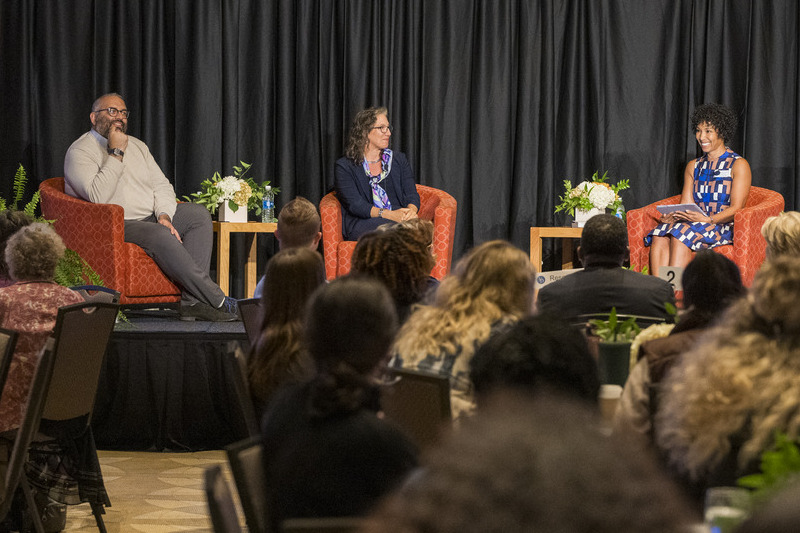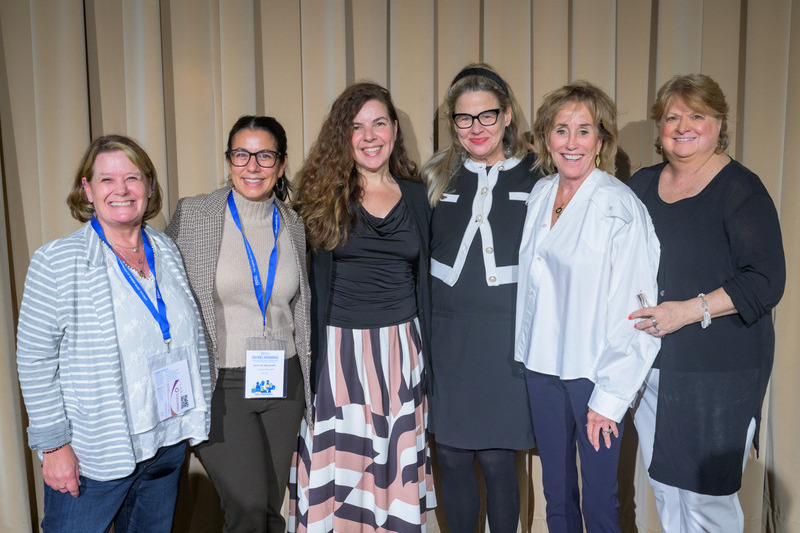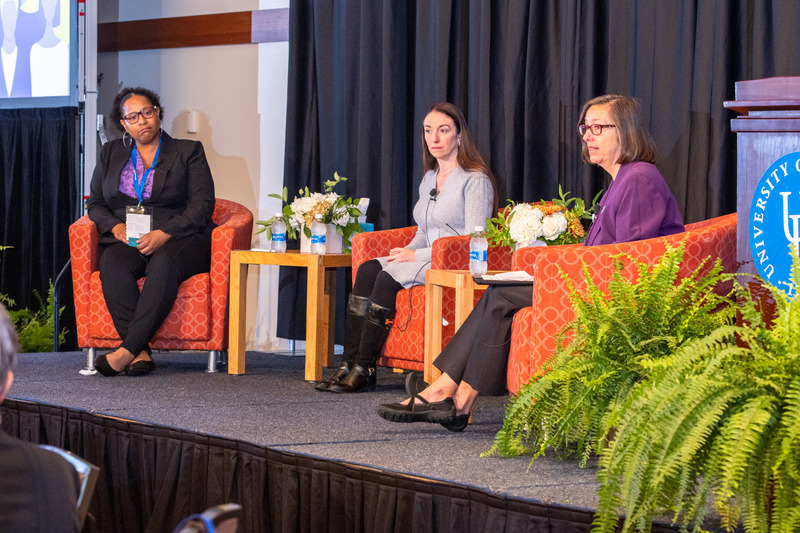


Hope in the fight against gender-based violence
Photos by Kathy F. Atkinson, Maria Errico and Evan Krape November 03, 2023
Students share lessons learned at UD-sponsored conference
The fight against gender-based violence is a multi-faceted and complex issue. So when the organizers of a recent national conference about the topic held at the University of Delaware started planning the event, they intentionally took an interdisciplinary approach.
The approach worked. More than 200 researchers, Delaware policymakers, survivors, advocates, filmmakers and UD students attended the Equitable Approaches conference, sharing the latest research and best practices on subjects including intimate partner violence, sexual assault, victimization, policing and more.
For UD students, the conference was eye-opening, inspiring and motivating.
“Being able to hear from everybody and coalesce that information into something actionable — something we can actually do — was amazing,” said Annaliese Pena, who is pursuing her master’s degree in public health.
Pena’s research focuses on domestic violence and impact of Covid-19 and other disasters, with the goal of creating resources and toolkits for shelter services and survivor providers across the country. She said hearing the stories of people who work in the field was a great complement to the quantitative work she does.
“[In research], you can't just hear from clinicians or from public health professionals in this kind of work. You have to engage with people on the ground who are doing this work every day,” Pena said. “So being able to include that emotional piece — that qualitative aspect from real people doing real work, who have real stories — has been very grounding for my work.”
Alyssa Tonetti, a senior majoring in English with minors in theater studies and women and gender studies, attended several panels, including a session on gun violence that included Delaware State Sen. Marie Pinckney and another focused on food deserts.
“There were a lot of different stories being told,” she said. “This is such a broad topic, and I thought it was interesting that UD was able to bring that all together in one place.”
Jordyn Bailey, a junior majoring in criminal justice with a minor in domestic violence prevention and services, volunteered at the event.
“It's just a nice thing to know that so many people care because it's not every day that you come face to face with people involved in this in one room,” Bailey said. “It's nice to know that there are other people out there who also care about this. It gives you hope.”
Highlights of the two-day event, which was hosted by the Center for the Study and Prevention of Gender-Based Violence, included a keynote panel discussion about college-based sexual assault with Jennifer Hirsch and Seamus Khan, authors of the book Sexual Citizens: A Landmark Study of Sex, Power and Assault on Campus. Moderated by Fatimah Conley, UD’s vice president of equity and chief diversity officer, and attended by President Dennis Assanis, Provost Laura Carlson and other senior leaders, the discussion focused on how institutions can make campuses safer and more inclusive.
They said campus leaders need to examine the root causes of the problem, including ensuring that students have medically accurate sexual education before arriving on campus, examining how various social groups on campus can become more equitable and inclusive, and evaluating how campus spaces can be used to provide students with areas to socialize safely.

Valerie Biden Owens, chair of UD’s Biden Institute, moderated a panel examining the history of the Violence Against Women Act (VAWA). Passed by Congress in 1994, VAWA was the first federal legislation specifically designed to end violence against women by creating and supporting comprehensive programs to address domestic violence, sexual assault, dating violence and staking.
Biden Owens was joined by Victoria Nourse, Ralph V. Whitworth Professor of Law at the Georgetown University Law Center, who co-authored the legislation while working for then-Sen. Joseph Biden, and Melina Milazzo, public policy deputy director of the National Network to End Domestic Violence.
VAWA has been reauthorized since 1994, with each new version of the bill adding more modern provisions. It now includes protections for immigrant women and ensures that LGBT Americans have equal access to the services funded by the Act. In 2022, the law was updated to allow sexual violence related crimes occurring on tribal lands to be prosecuted within the tribal court system.

The event also included a heart-wrenching session with two survivors of domestic violence who relayed their stories about how the justice system both helped and hurt them.
Sov Im, a junior majoring in women and gender studies, grew up hearing stories of domestic violence. Attending the session impacted her personally.
“Being able to hear these women's stories, to hear how they get past it all, how they just overcome, and then they're out here helping other women, is really inspiring, and just motivates me to want to be able to do the same thing,” Im said.
About the Center for the Study and Prevention of Gender-Based Violence
The Center is dedicated to the study of, prevention of and support for survivors of domestic violence, sexual assault, sexual harassment, stalking, human trafficking and other forms of gender-based violence. Its scholarship seeks to document, investigate and ameliorate the causes and effects of gender-based violence.
The Center is the first of its kind to provide professional training at the undergraduate level to prepare students to work in the field of gender-based violence prevention and intervention.
Resources
UD’s Sexual Offense Support program provides crisis support and victim advocacy and is available 24/7 by calling (302) 831-1001 and pressing “1”. Members of the University community are reminded to be vigilant: If you see something, say something. Call 911 to report suspicious activity.
For additional information on safety and wellness topics at UD, visit www.udel.edu/students/safety/.
Members of the UD community may download a free smartphone app, LiveSafe, that lets users submit tips to police, receive important broadcast notifications and contact the University of Delaware Police Department directly. To learn more, visit this LiveSafe website.
Contact Us
Have a UDaily story idea?
Contact us at ocm@udel.edu
Members of the press
Contact us at 302-831-NEWS or visit the Media Relations website

